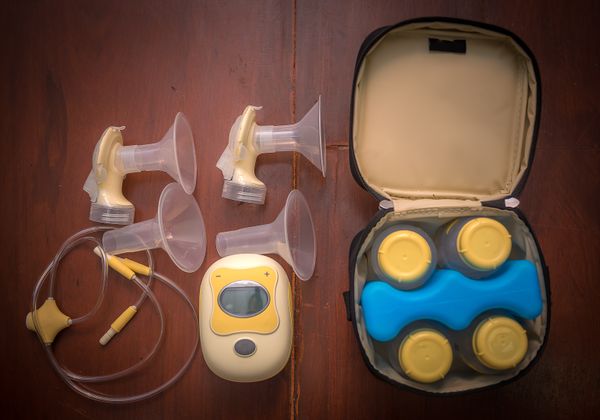You've finally gotten the hang of breastfeeding and are enjoying this intimate activity with your child. But maybe you're going back to work and need the flexibility of bottle feeding. Or baby's teeth have been doing a number on your skin. Or you're ready to have another baby. Whatever the reason, it may be time to stop breastfeeding, a process known as weaning. A baby is considered weaned when she stops nursing and gets all her nutrition from sources other than the breast.
If there is no compelling reason to stop breastfeeding, remember that the American Academy of Pediatrics recommends breastfeeding as the sole source of nutrition for your baby's first six months. Even when your baby start eating solids, the pediatricians group recommends continuing breastfeeding until your baby is at least 12 months. You may continue breastfeeding longer, if you and your baby want to.
When you decide to wean, know that there is no right or wrong way to do it. Wean in whatever way works best for you. And know that the process can take days, weeks or months. Rushing weaning will only upset your child and make the transition bumpy. And weaning doesn't mean that the bond you created with your child through nursing is done. It just means that you're nurturing and nourishing him in other ways. Here are some tips on how to successfully go from breast to bottle or to eating solids.
Pick a date.
Figure out when you want to wean. Then allow for a month to get the job done. That way you and baby will have some breathing room if any issues or obstacles arise along the way. Certain times aren't the best to wean. For example, don't wean if your little one just started teething or is sick, you're going through a life change like moving or you've just gone back to work. Stressful situations when you both need some comfort can make weaning challenging. Know that you're the best judge of when it's time to wean. So, your "deadline" should work for you and baby. Don't compare your situation to others, and reconsider any deadlines you may have set when you were pregnant or baby was younger.
Ease into it.
Don't go cold turkey on breastfeeding. Ease into the process; otherwise, it may be traumatic for both of you. For example, cut out one daily session each week, such as the one that's the least convenient for you or that is least interesting to baby. Or reduce your nursing time. Try five minutes on the breast if he usually nurses for 10 minutes, for example. (Children tend to be more attached to the first and last feedings of the day, which are times when they need greater comfort. So those he may drop those sessions last.) During those times, comfort and nurture him with one-on-one activities like massaging his back, singing a song or reading a book. Or you can see what happens if you offer a cup of formula or milk or bottle instead of nursing. Reducing feedings gradually over a few weeks lets your child adjust. And your milk supply slowly decreases this way, without leaving you with engorged breasts.
Cater to your baby's age.
If your baby is nine months or older, go directly to a cup. That way, you don't have to get her off the bottle in a few months when you switch to a cup. Limit nursing time, instead comforting her with quality TLC and attention. Try giving kids on solids a lunch of solid foods. Then see if she'll naturally give up her midday breastfeeding session. Then once you drop this one, you can try to drop another. For older children that you can reason with, postpone a feeding. Reassure her that you'll nurse her soon (if she requests it). Distract her with another activity. Explain that she must wait until bedtime if she wants to nurse. If she's insistent, nurse her. Otherwise, refusing to breastfeed when she wants to do so can backfire because she'll focus more intently on it.
Switch things up.
You don't have to be the one doing all the feedings. Let grandma, dad or another caregiver help you out. If your baby won't take a bottle from you, see if he'll take one from someone else while you're in another room. You can also tweak your routine by nursing in a different place than you normally do, like moving from the bedroom to the living room. Or try holding him in another position. Return to how you usually do things if these strategies don't work. Then try again in a few weeks.







